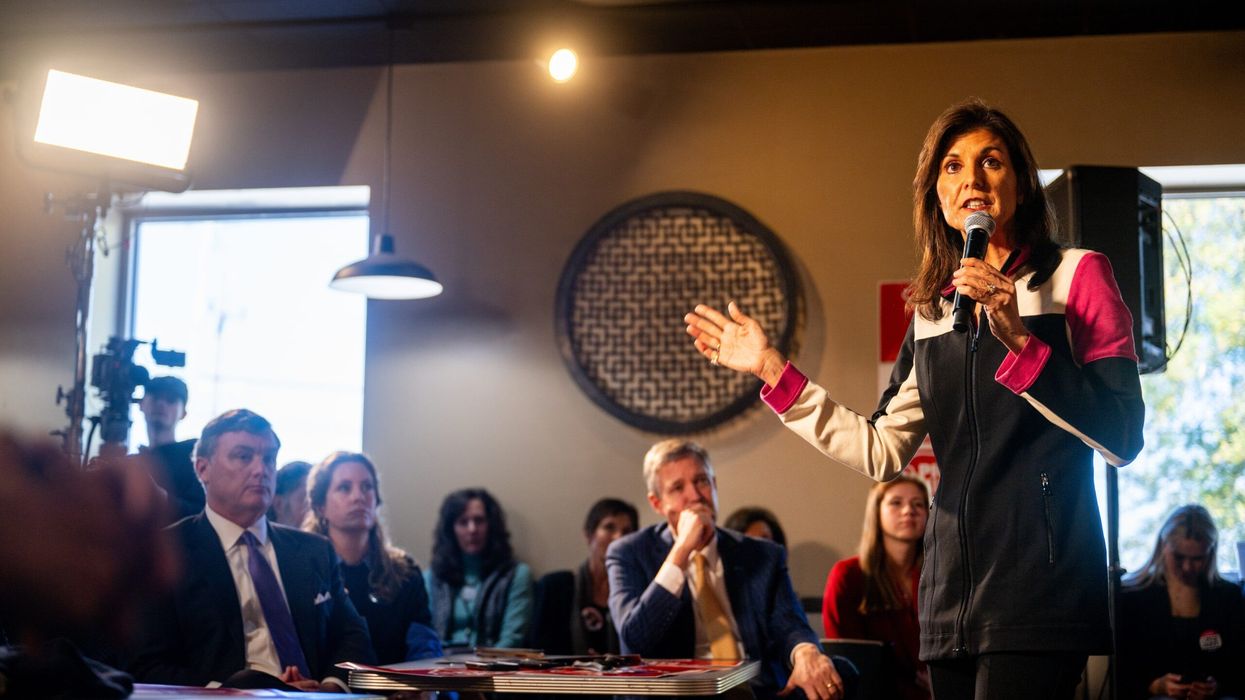At a South Carolina barbecue joint, Nikki Haley attempted to inspire the crowd, despite polls indicating that Donald Trump is poised to significantly outperform her in the Republican presidential primary in her home state.
"Head-to-head, Trump does not beat Joe Biden. I defeat Biden," the former South Carolina governor told supporters on Thursday (1), as steam rose from piles of fried chicken and pulled pork on a buffet nearby.
The ex-UN ambassador is now the sole challenger to her former boss, with Haley, 51, hoping a home advantage will help her in the Palmetto State's primary on February 24.
Her message is aimed at more moderate Republicans and wavering Democrats -- focusing on the "chaos" of Trump's first term, and bashing both the 77-year-old and 81-year-old Biden as too old for a second term.
She faces an uphill battle. A Washington Post/Monmouth University poll released Thursday showed Trump leading Haley by 58 per cent to 32 per cent.
Still, supporters at Doc's Barbecue restaurant in South Carolina state capital Columbia said she could still win, describing the race as a choice between a "Republican and a fascist".
"I just love her moral fiber," said Sarah Rock, from Columbia, sporting a red, white and blue "I Pick Nikki" badge on her blouse. "She's not going to have criminal issues and I think she is what our country needs."
Jody Lowman, from Lexington, South Carolina said he loved Haley's stump speech. "Trump, he’s going to lead us in another World War, if Biden doesn’t do it for us," he said.
- 'Country to save' -
Her rival's shadow is never far away though. Outside the Haley rally, a pickup truck flying pro-Trump flags drove up and down the road in a seemingly endless loop.
For weeks Trump has portrayed himself as the presumptive Republican nominee as he seeks an extraordinary comeback to the White House.
Trump steamrollered the first two Republican votes in Iowa and in New Hampshire, where Haley had hoped to appeal to its more independent voters.
Unlike Florida governor Ron DeSantis, Haley has refused to bow out and let Trump focus on battling Biden. She points to a series of polls showing that she would be more likely than Trump to defeat him in a hypothetical match-up.
Trump has therefore been forced to keep fighting in South Carolina, using resources that he would rather use on his national campaign -- and the multiple legal cases he faces.
"I wouldn't give Nikki water if she was thirsty," said caregiver Regina Sidik, 56, after local pro-Trump Republicans held a press conference on the steps of the South Carolina statehouse on Thursday.
Wearing a "Team Trump" t-shirt and carrying a red Trump banner, Sidik said she had voted Democrat for 20 years but switched to the tycoon and former reality TV star because she wanted to "make America great again."
Haley's hopes for a home advantage in South Carolina meanwhile may be misplaced.
"Haley's not the good one. She's didn't do anything for none of us," said Sidik.
- 'Not going anywhere' -
Haley has also walked into a series of controversies during the campaign, including when she failed to say recently that slavery was the cause of the American Civil War.
The issue was a pertinent one in South Carolina, with a large Black population that Democrats -- who hold their primary in the state on Saturday -- are also trying to woo.
But her persistence in staying in the race has got under Trump's skin.
In a bad-tempered victory speech in New Hampshire, Trump surrounded himself with leaders from South Carolina, including the current governor, in a show of strength, and lashed out at Haley for refusing to quit.
Trump has also resorted to racially-charged barbs, repeatedly referring to Haley, the daughter of immigrant parents, her by her first name Nimarata -- on one occasion misspelling it on social media.
The move was reminiscent of his frequently calling Barack Obama by his middle name, Hussein, as part of his false smears that Obama was born outside the United States and ineligible to be president.
Haley said she had "no personal problems" with Trump but insisted that she would fight on in South Carolina and beyond, so long as she kept closing in on Trump's vote share.
"This is a state we have worked really hard on," she told reporters after her rally.
"We're not going anywhere."
(AFP)




